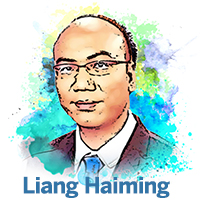President Xi Jinping delivered a keynote speech at the 2024 Summit of the Forum on China-Africa Cooperation (FOCAC) on Sept 5 in Beijing.
 He pledged that China is determined to deepen cooperation with African countries and has drawn up a grand blueprint for it going forward. He put forward “10 partnership actions” for deepening China-Africa cooperation and spearheading the Global South modernization, which not only points the way for future development of China-Africa cooperation but also shows Hong Kong, a center of international finance and a global trade and logistics hub in its own right, the expansive stage for its new role in boosting China-Africa cooperation.
He pledged that China is determined to deepen cooperation with African countries and has drawn up a grand blueprint for it going forward. He put forward “10 partnership actions” for deepening China-Africa cooperation and spearheading the Global South modernization, which not only points the way for future development of China-Africa cooperation but also shows Hong Kong, a center of international finance and a global trade and logistics hub in its own right, the expansive stage for its new role in boosting China-Africa cooperation.
As a bridge linking China and the rest of the world, Hong Kong is in a unique position to put its advantages — such as a highly internationalized business environment, a full-fledged judicial system, a free market economy and worldwide business connections — to good use.
Hong Kong can no doubt capitalize on those advantages while taking the opportunities arising from ongoing China-Africa cooperation, serving as an important platform for China-Africa cooperation in foreign trade, investment, financial services and cultural exchanges, so as to explore and discover new opportunities in African countries and help to raise the China-Africa comprehensive strategic partnership to a higher level.
As comprehensive cooperation between China and Africa is set to strengthen, Hong Kong will no doubt have more opportunities to play a number of new roles in the near future.
First, Hong Kong should be the bridgehead for China-Africa cooperation. As a free port and trade and logistics hub, the city should be an important window for bilateral trade that will boost the free flow of goods, capital, technology and services between China and Africa.
For example, Hong Kong can host China-Africa economic and trade forums, investment promotion roadshows and so on to enhance mutual confidence and information exchange without which expanding cooperation cannot proceed.
Second, Hong Kong should become a financial services hub for African countries. Hong Kong’s strength as a global financial center will go a long way in offering African countries such services as business financing, insurance, risk management and many more in support of infrastructure development, industry upgrade and sustainable development projects.
Meanwhile, as a regional center of international finance, Hong Kong should push for the internationalization of renminbi in Africa and provide a relatively simple and inexpensive clearing service for growing China-Africa trade.
Third, Hong Kong could take on a role as a cultural and educational exchange platform. Hong Kong has long been a meeting place for Eastern and Western cultures and should therefore step up cultural and educational exchanges with African countries through culture and arts exhibits as well as hosting education forums to promote mutual understanding and friendship.
At the same time, Hong Kong should encourage its universities to join hands with their African counterparts in opening schools and conducting joint research to meet African countries’ need for multitalented young people with global vision.
Fourth, Hong Kong should promote China-Africa partnerships in infrastructure development cooperation. Hong Kong boasts rich experience and professional capability in such essential disciplines as project management, engineering design and financing of infrastructure construction involving international partnerships, such as communications, energy resources and transportation facilities, which are required for the modernization of African countries.
More importantly, Hong Kong should seize the opportunities arising from deepening comprehensive cooperation between China and Africa, especially in helping African countries cultivate a digital economy.
Such cooperation projects will not only boost economic growth and development but also propel technological innovation and application development for all parties involved to advance their socioeconomic growth with increased vitality.
That said, it is common knowledge that opportunities come with numerous challenges, which I have discovered during recent study trips to Ethiopia, Tanzania, Djibouti and Zimbabwe. We must be prepared to face the reality that Hong Kong will encounter not just new opportunities doing cooperation with African countries but tough challenges as well, including:
1) Given the complicated and sometimes volatile politico-economic situations in quite a few African countries, Hong Kong must be prepared to handle any challenge properly first and foremost before its cooperation with African countries can continue, with different approaches specific to individual nations.
2) As China-Africa cooperation expands the international community will be increasingly attracted to the African market, which means fierce competition from all around the world for Hong Kong and all parties involved. There is no question that many of the city’s competitors are more resourceful and sophisticated and therefore should be carefully studied in advance so that Hong Kong is well-prepared for the anticipated competition.
3) Cultural disparities between China and Africa are another sensitive issue that must not be overlooked. Factors such as language barriers, religions, values and business customs all deserve careful study and respect at all times.
The underdevelopment of infrastructure and human resources in African countries means Hong Kong will need to inject more resources into cooperation with African countries in order for the projects concerned to succeed.
All in all, the Hong Kong Special Administrative Region government is better off assuming full responsibility for tailor-made policies and planning designed to facilitate the city’s long-term partnership with African countries on the back of comprehensive and deepening China-Africa cooperation in the days to come.
The author is chairman of the China Silk Road iValley Research Institute and dean of the Belt and Road Research Institute, Hainan University.
The views do not necessarily reflect those of China Daily.


